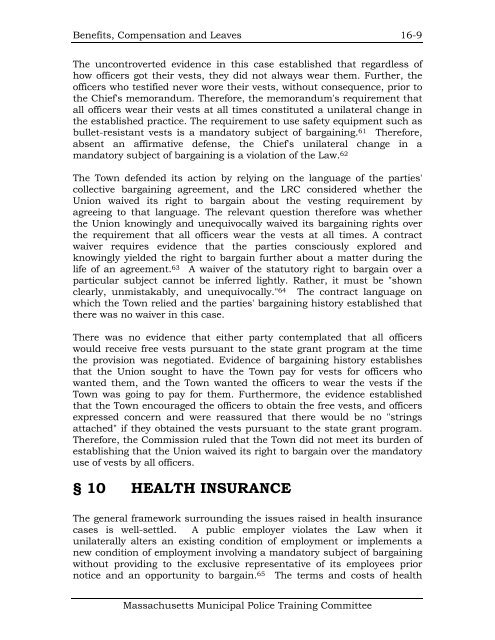Management Rights - AELE's Home Page
Management Rights - AELE's Home Page
Management Rights - AELE's Home Page
Create successful ePaper yourself
Turn your PDF publications into a flip-book with our unique Google optimized e-Paper software.
Benefits, Compensation and Leaves 16-9<br />
The uncontroverted evidence in this case established that regardless of<br />
how officers got their vests, they did not always wear them. Further, the<br />
officers who testified never wore their vests, without consequence, prior to<br />
the Chief's memorandum. Therefore, the memorandum's requirement that<br />
all officers wear their vests at all times constituted a unilateral change in<br />
the established practice. The requirement to use safety equipment such as<br />
bullet-resistant vests is a mandatory subject of bargaining. 61 Therefore,<br />
absent an affirmative defense, the Chief's unilateral change in a<br />
mandatory subject of bargaining is a violation of the Law. 62<br />
The Town defended its action by relying on the language of the parties'<br />
collective bargaining agreement, and the LRC considered whether the<br />
Union waived its right to bargain about the vesting requirement by<br />
agreeing to that language. The relevant question therefore was whether<br />
the Union knowingly and unequivocally waived its bargaining rights over<br />
the requirement that all officers wear the vests at all times. A contract<br />
waiver requires evidence that the parties consciously explored and<br />
knowingly yielded the right to bargain further about a matter during the<br />
life of an agreement. 63 A waiver of the statutory right to bargain over a<br />
particular subject cannot be inferred lightly. Rather, it must be "shown<br />
clearly, unmistakably, and unequivocally." 64 The contract language on<br />
which the Town relied and the parties' bargaining history established that<br />
there was no waiver in this case.<br />
There was no evidence that either party contemplated that all officers<br />
would receive free vests pursuant to the state grant program at the time<br />
the provision was negotiated. Evidence of bargaining history establishes<br />
that the Union sought to have the Town pay for vests for officers who<br />
wanted them, and the Town wanted the officers to wear the vests if the<br />
Town was going to pay for them. Furthermore, the evidence established<br />
that the Town encouraged the officers to obtain the free vests, and officers<br />
expressed concern and were reassured that there would be no "strings<br />
attached" if they obtained the vests pursuant to the state grant program.<br />
Therefore, the Commission ruled that the Town did not meet its burden of<br />
establishing that the Union waived its right to bargain over the mandatory<br />
use of vests by all officers.<br />
§ 10 HEALTH INSURANCE<br />
The general framework surrounding the issues raised in health insurance<br />
cases is well-settled. A public employer violates the Law when it<br />
unilaterally alters an existing condition of employment or implements a<br />
new condition of employment involving a mandatory subject of bargaining<br />
without providing to the exclusive representative of its employees prior<br />
notice and an opportunity to bargain. 65 The terms and costs of health<br />
Massachusetts Municipal Police Training Committee
















